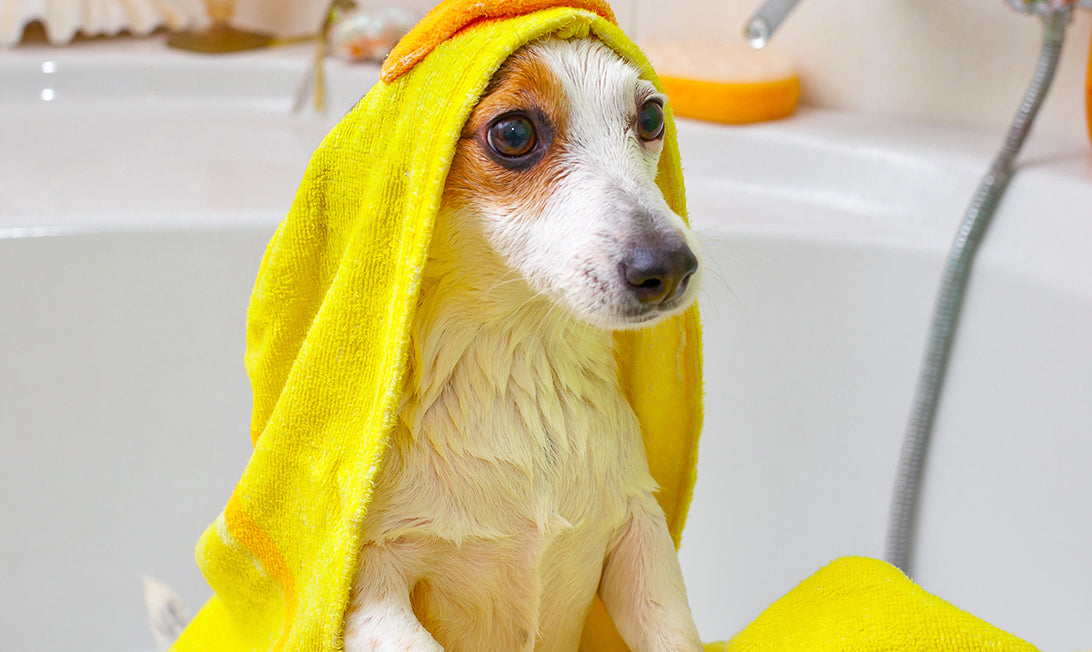When it comes to pets, pet owners will do almost anything to keep their pets safe. Pet owners get their pets vaccinated, make sure they're eating nutritious meals, and take them to the vet if something is wrong. But have you thought about how your cleaning products could be harming your pets?
It’s not something many pet owners think about, but since you use cleaning products where your pets often walk, eat, and sleep, it’s important to make sure those surfaces aren’t covered in toxic cleaners.
Here is a list of how to ensure you choose non-toxic cleaning products to help keep your pet safe.
Pet Exposure to Cleaning Products

While it might not seem like your pet would come into contact with cleaning products, they are more exposed to cleaning products because of their behavior and body types than you may assume.
The floor may not be a high contact area for humans, especially when you are wearing shoes or socks, but pets like cats and dogs often lick floors, especially when food crumbs are dropped. Animals with padded feet such as cats and dogs can also absorb chemicals through their paws and often lick their paws.
Other surfaces such as carpets and couches are often treated with shampoos, and since house pets like cats and dogs can spend many hours laying on these surfaces, it’s important to keep them pet-friendly. Another contact point can be windows. Dogs also often put their permeable noses up to windows, so it’s important to keep your glass cleaner non-toxic if you have a pet.
Also, keep in mind your washing detergent, odor remover, and dish soap, which are all often used to clean or deodorize surfaces regularly used, licked, and slept on by pets.
What Not to Choose
Cleaning products have a hard job; they strip back dirt, kill germs, and keep surfaces sparkling. Because of these requirements, many cleaning products may contain harsh ingredients that can be toxic to animals.
Ammonia
One common toxic ingredient to avoid if you have a pet is ammonia.
Ammonia is extremely useful as a cleaning tool because it can break down fats, grime, and stains. It also evaporates quickly, making it ideal for creating a streak-free finish on glass.
Unfortunately, ammonia is very strong and can be toxic to pets. Close exposure can result in skin and eye irritation, and surface licking can lead to a burning sensation in the throat or stomach.
Bleach
Bleach is another common cleaning product. Bleach is the ultimate whitening tool and disinfectant, but it is especially toxic to dogs.
Ingestion of bleach can result in vomiting, drooling, ulcers, pain, difficulty breathing, and even seizures if ingested at high levels. Skin contact can also result in a burn or rash, and eye transfer may require immediate veterinary attention.
Borax
Borax is a common cleaning product used as a pesticide and for stain, mold, and mildew removal. But while Borax may be an effective cleaner, it is also toxic to animals.
Ingestion or physical contact with Borax can result in your pet experiencing oral pain, vomiting, diarrhea, tremors, balance issues, tiredness, and a rash. In extreme cases, organ failure can occur.
Detergents
Detergents are regularly used in laundry and dishwashing products but can be toxic to pets like cats and dogs.
Eye contact, skin contact, and ingestion of detergents are especially dangerous for pets. Eye contact can result in red, sore, blinking eyes, and skin contact can lead to blistering and a rash. Ingestion can cause diarrhea, vomiting, facial swelling, ulcers, and drooling. Extreme cases can lead to breathing issues and possibly collapse.
Non-Toxic Cleaning Products for Pets
Knowing what ingredients to avoid will help you create a safer home for your pets, but it is still important to have effective cleaning products that also keep your pets safe from bacteria and infection.
Look for labels like non-toxic and plant-based when choosing your pet-friendly cleaning products. To make it easier, here are some of the bacteria and viruses to be aware of when searching for a non-toxic cleaning product that is still effective.
MRSA
MRSA, or Methicillin Resistant S. Aureus, is a staphylococcus bacteria that is especially hard to treat because of its resistance to antibiotics. MRSA can be dangerous to pets and humans, and research shows that pets can get it and go on to infect humans (1). Looking for a non-toxic cleaning product that is effective against MRSA is important for pet health and owners.
Salmonella
Salmonella is a bacteria that can be transferred through food, feces, and pets. Animals such as reptiles, birds, cats, and dogs are at risk of transmitting salmonella through their water, fur, feathers, bedding, and feces. Salmonella can result in animals experiencing vomiting, diarrhea, or a fever, but it is also especially dangerous for humans (2, 3). It is important to own a salmonella-destroying cleaning product if you own a pet.
Parvovirus
For those with dogs, you should be on the lookout for a cleaning product that targets parvovirus. This infectious virus leads to vomiting, diarrhea and can be fatal (4).
Canine Influenza
Dogs can get the flu too. Canine influenza is a contagious respiratory disease that causes flu-like symptoms and can lead to secondary pneumonia. Spread by droplets, it’s important to look for cleaning products that kill this virus, especially if you have multiple dogs (5).
For a product that targets all of these issues and more, SteriCide® from PetFX® is a great choice. This cleaner kills all the viruses and bacteria on this list and more, while still being safe to use around animals.
The Bottom Line
Many cleaning products are toxic and dangerous to pets, who often spend time lying, licking, and walking on the surfaces you clean using them.
To keep your pet safe, it's important to choose non-toxic cleaning products that will also protect them and you from various bacteria and viruses that could cause harm.



